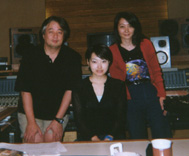|
BEGINNING Studio
recording had started on August 28, 1999. Not
all songs were composed at this point. Click
and piano guiding are certainly necessary in order to get chorus part
out. After
all the work is done, then chorus part will be recorded. |
 |
It's
a small picture, but it's Mr. Yoshioka, co-producer, ANNASUGAR, the
guest vocalist, and I. |
|
CONCEPT The
concept was, of course, "Asian healing". However,
there was a big point on producing this album. That
was "It will be sold in Japan and all over the world". Opportunity
to make "Mai" came around after I joined to produce "Takeda
no Komori-Uta" and "Song of Birth" in "Tsuki -
various artist 3" album. It was very well received in both Japan
and USA, and that gave me the opportunity to make a solo album. According
to questionnaire survey, "Takeda no Komori-Uta" was more
popular overseas, where as "Song of Birth" was popular in
Japan. There
was a clear difference in opinion between inside and outside of Japan. I
had been feeling that difference myself from before. A
while back, when I went to Nashville, Tennessee, USA, for recording,
American musicians showed great positive response to traditional Japanese
songs, however, they didn't show any interest to rock. On
the other hand, Japanese shows no interest to traditional Japanese
music because they have been listening to it since their childhood. It
is OK to sing in Japanese. That was my decision. Yet,
ethnic music has been very popular in Japan, and, so, "Song of
Birth" was receiving pretty well attention in Japan. So,
what came to my mind is to produce "Mai" by putting a taste
of Japan along with whole Asia... And,
of course, Geisha and Karate. Image
of Japan in overseas includes Chinese continent.
I decided to draw an image of Mai like the image of Japan Hollywood
draws. I
wrote and composed "Konjaku-Monogatari" because I hoped
for Japanese people not to forget the good part of Japan. I
have composed songs which vast continent of Asia can be felt. A
few songs are expressed by using coined words. I
would be pleased if it sounds to your heart too. I
will never forget the impression that I got when I heard the sound
of Asian instruments over my singing voice. |
|
Multiplex
chorus Solo
album artists would record in an intensive period of time, however,
studio musicians like myself cannot do that, schedule wise. I
reserved studio for recording of Mai on all Saturdays and Sundays,
days that I usually don’t have work scheduled. But,
things don't go quite it was planned. I simply extended days as I
receive other studio work. It
was already November when I finished the very last song. There
is a lot of ways in one-man multiplex chorus. Usually,
when you record a back chorus of an artist, you sing same part twice,
called "double". For
"Mai" and "Air", it was not double, mostly I sang
the same part three to four times. ("First love" was absolute
single solo) This
work of putting one over another. For
"Mai", there was a song with 4 parts with 3 vocal lines
in each. It
is massive amount of chorus. If
you calculate a five minutes long song, three voices times four parts
times recording the same thing four times...that comes out to be 48
voices times five minutes = 240 minutes. It
would simply take four hours if I continuingly sing without stopping. Nevertheless,
songs that I made like weaving silk are very pleasant. |